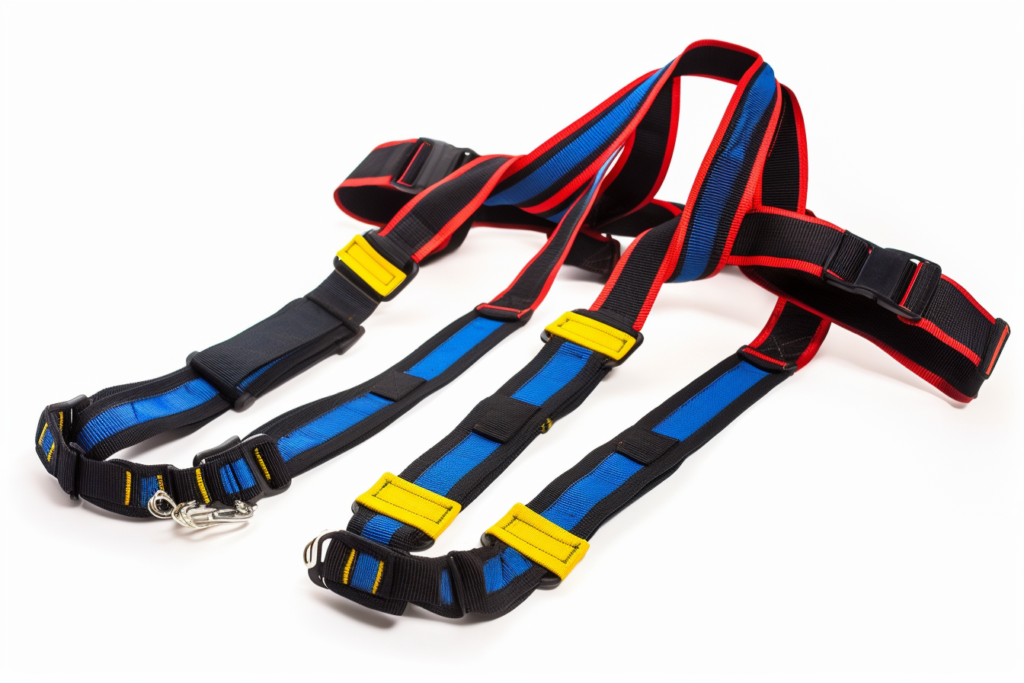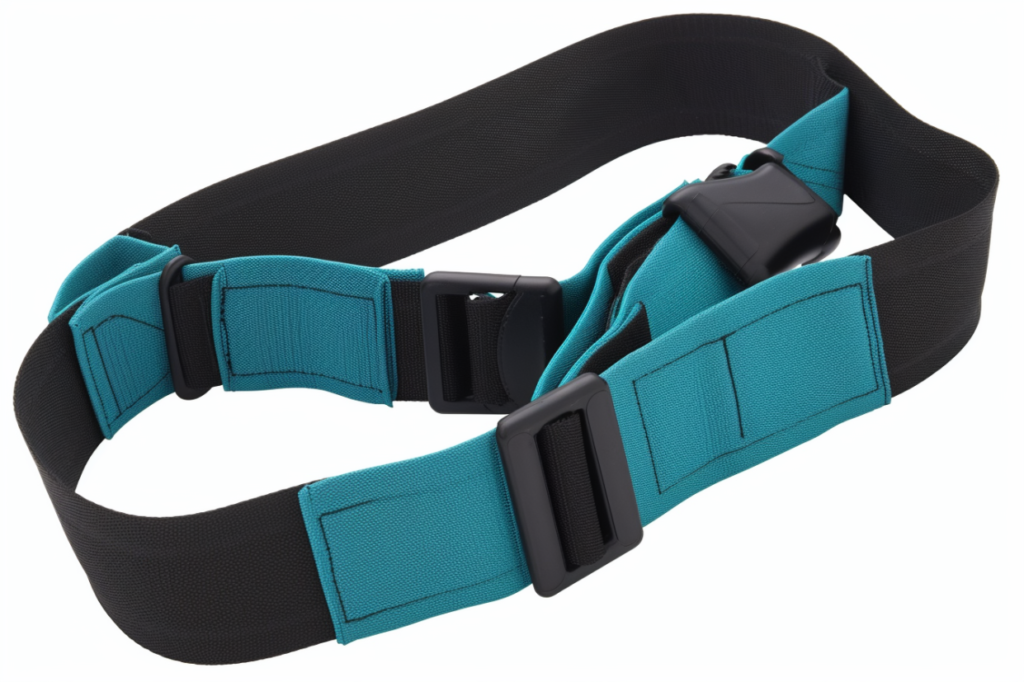
Custom-manufactured webbing for safety-critical applications — built to your exact specifications, with low MOQs, full compliance support, and performance you can trust.
At Anmyda, we don’t sell finished straps — we manufacture the webbing that powers them. Whether you’re developing a fall harness, tactical gear, or neonatal restraint, we help you select the right materials, structure, and finish for your application. From early-stage prototyping to production-ready specs, our team supports your product goals with fast sampling, compliance insight, and small-run flexibility.
We supply custom webbing to OEMs and product developers across multiple safety-critical industries. Whether you’re building gear for human protection, medical support, or tactical performance, we help you meet the strength, comfort, and compliance demands of your specific application.
Skin-safe, stretch-calibrated materials
ISO 10993-tested webbing options
Custom softness, edge finishing, and color coding
High tensile strength, abrasion resistance
Flame-retardant and UV-stabilized options
Engineered to meet ANSI and EN standards
Silent matte finishes, MOLLE-compatible width
IR signature control (low reflectivity)
Load-rated and color-matched for mission-critical use
OEKO-TEX® certified for infant use
Woven logo integration and color ID
Bite-safe edges and consistent stretch behavior
Soft inner feel + structured load zones
Controlled stretch for lumbar support
Coating-ready substrates (TPU, anti-slip)
Comfort-rated for skin contact
Anti-fray edges and precise tensile limits
Branding and outdoor durability included
If your product uses webbing to protect, support, or restrain, we can build it to spec — and to scale.
There’s no one-size-fits-all formula for safety webbing. Medical restraint straps need biocompatibility and skin comfort. Fall harnesses demand tensile strength and abrasion resistance. Child safety gear must meet global chemical compliance. At Anmyda, we help you balance these competing requirements — so your webbing performs exactly how your product needs it to.
✔️ ISO 10993-certified for skin contact
✔️ Soft-touch finishes for infant and patient safety
✔️ Calibrated elasticity for secure, flexible restraint
✔️ Low-fray edges to prevent skin irritation
✔️ Color-coded options for easy device integration
For medical and neonatal applications, comfort and compliance are critical. We manufacture webbing that passes ISO 10993 biocompatibility testing, while maintaining the right stretch resistance and edge softness for sensitive skin contact. Whether you’re building monitoring belts or adjustable patient restraints, we help ensure the material enhances device safety and passes regulatory review.
Harness systems require webbing that performs under load, resists abrasion, and meets strict safety standards. We work with OEMs to deliver webbing with proven tensile strength, flame-resistance where required, and dimensional consistency for safety-critical use.
✔️ High-tensile polyester or nylon construction
✔️ Abrasion- and flame-resistant finishes
✔️ Reinforced edge profiles for heavy wear zones
✔️ ANSI/EN-compatible strength ratings
✔️ Custom widths for buckle or D-ring integration
✔️ Matte finishes with low IR reflectivity
✔️ Compatible with MOLLE/PALS systems
✔️ Color-stable webbing for long-term deployments
✔️ Edge protection for heavy-duty stitching
✔️ Strength-to-weight optimization
Military-grade gear demands stealth, strength, and field-tested performance. We produce tactical webbing with IR-control coatings, mission-ready tensile ratings, and the weave precision needed for modular system compatibility — from chest rigs to plate carriers.
Parents demand safety and comfort — so do regulators. We help children’s product developers meet OEKO-TEX® and chemical safety standards while maintaining the durability, softness, and branding flexibility they need to bring their products to market.
✔️ OEKO-TEX® certified and saliva-safe
✔️ Anti-fray and soft-edged designs
✔️ Low-stretch for controlled movement
✔️ Woven logos and color cues for brands
✔️ Compatible with stroller or car seat anchors
✔️ Custom stretch zones and compression control
✔️ Inner comfort layers with soft backing
✔️ Coating-ready substrates for anti-slip use
✔️ Repeatable elasticity for consistent support
✔️ Wash-resistant material options
Performance webbing for orthopedics and fitness requires comfort and repeatable load behavior. We help teams dial in compression characteristics, lamination compatibility, and softness without compromising mechanical performance or wash durability.
Pet mobility products must be strong, safe, and comfortable — and often stylish. We provide webbing that balances softness and strength, resists chewing and wear, and integrates seamlessly into your product’s visual identity.
✔️ Gentle feel for skin and fur contact
✔️ High-tensile strength for load-bearing safety
✔️ Bite-safe edge constructions
✔️ Weather-resistant and odor-resistant coatings
✔️ Brand-color matching and woven logos
If you’re designing safety-critical products, you’ve probably hit at least one of these roadblocks. Whether it’s compliance failure, poor fit, or endless sampling cycles, our job is to make your development process smoother — and your webbing a perfect match from day one.
🔧 “We don’t need thousands of meters — just a sample that works.”
We support small-batch prototyping and product testing with low MOQs and quick-turn custom samples. Our development process is optimized for product launches, not just mass production.
🔍 “We can’t find webbing that passes our biocompatibility or flame test.”
We’ve helped multiple OEMs qualify webbing for ISO 10993, OEKO-TEX®, and flammability standards like FMVSS 302 and EN 71. We’ll guide you to the right yarns and coatings that pass testing without overengineering.
🧵 “Our current supplier can’t match our stretch or feel requirements.”
We tune elasticity, softness, edge structure, and weave tightness to get the performance you need — whether you’re building restraint systems, orthopedic belts, or pediatric gear.
📏 “We need webbing that fits our hardware precisely.”
We control width, thickness, and edge profile down to tight tolerances, so your webbing works with buckles, loops, and guides without jamming, curling, or shifting under load.
🎨 “We want our branding woven in — not just printed.”
We offer jacquard logo weaving and custom color matching so your safety gear not only works, but reflects your brand with lasting visibility and compliance-friendly integration.
📦 “We need fast feedback and flexible production support.”
We respond quickly with engineering-backed recommendations, sample validation, and production that scales — with realistic timelines and clear technical communication.
Have one of these issues? We’ve solved it before
Every application comes with different stress loads, compliance requirements, and user expectations. That’s why we offer a focused range of safety-grade materials, each selected for its mechanical behavior, comfort, and compatibility with coatings or branding. Whether you need elasticity, durability, or chemical resistance — we help you spec the right base for your build.
| Material Type | Key Strengths | Limitations | Ideal Use Cases | Certifications Available |
|---|---|---|---|---|
| High-Tenacity Polyester | High tensile strength, low stretch, abrasion and UV resistant | Slightly stiff feel, limited elasticity | Harnesses, tactical straps, child seats | OEKO-TEX®, FMVSS 302, EN 71 |
| Nylon 6 / Nylon 6,6 | Strong with excellent shock absorption, soft hand feel, flexible under load | Absorbs moisture, lower UV resistance | Pet harnesses, orthopedic supports, dynamic restraint zones | ISO 10993 (select variants), REACH |
| TPU-Coated Webbing | Waterproof, chemical-resistant, easy to clean, stretch control | Higher cost, not breathable | NICU straps, hygiene-critical gear, fitness belts | ISO 10993, USP Class VI, FDA 21 CFR |
| Silicone-Coated Polyester | Skin-safe, non-slip, excellent flexibility, maintains grip when wet | Limited color range, premium pricing | Pediatric restraints, anti-slip applications | ISO 10993, OEKO-TEX® |
| Woven Elastic Webbing | Controlled stretch (10–40%), breathable, soft edges | Limited lifespan under UV or heavy loads | Orthopedic belts, sports gear, medical supports | OEKO-TEX®, ISO 13934-1 (tensile) |
| Non-Woven Laminated Straps | Compression-friendly, high comfort, compatible with Velcro | Lower abrasion resistance, limited edge control | Disposable or semi-permanent restraints | ISO 10993 (dependent on laminate) |
| Kevlar® / Aramid Blends | Flame-retardant, extremely high strength, heat-resistant | Expensive, may be too stiff for skin contact | Tactical and industrial fall protection | ANSI/ISEA 107, NFPA 1971 (select uses) |
Need help selecting the right material? We can recommend options based on your tensile, stretch, and compliance targets
Lorem ipsum dolor sit amet, consectetur adipiscing elit. Ut elit tellus, luctus nec ullamcorper mattis, pulvinar dapibus leo.
Beyond material selection, the design of the webbing itself plays a crucial role in how your product performs. We fine-tune weave structure, edge finish, stretch behavior, and compatibility with buckles, coatings, or branding — so your webbing does exactly what it needs to do, under the conditions it was built for.
✅ 1. Edge Construction
Soft-cut or woven-edge options minimize skin irritation, fraying, or edge curling — critical for child restraints, orthopedic supports, and long-wear applications.
✅ 2. Weave Density & Pattern
Tight weaves enhance tensile strength and reduce elongation. Satin or twill patterns may be used for comfort or stretch calibration in elastic zones.
✅ 3. Stretch Calibration
Elastic or semi-elastic zones can be engineered for controlled elongation (e.g. 20–30%) to provide secure hold without over-tightening — often used in fetal monitors or belts.
✅ 4. Thickness & Stiffness Control
Webbing can be tuned for pliability or rigidity, depending on how it must behave with buckles, loops, or body movement. We can match your compression or load profile.
✅ 5. Branding Integration
Custom jacquard logos, woven color coding, or specific color matching for brand consistency, visual cues, or part differentiation.
✅ 6. Hardware Compatibility
We engineer webbing widths and thicknesses to work seamlessly with your buckles, adjusters, or fasteners — avoiding issues like jamming, folding, or slippage.
Need webbing that holds up in real-world conditions?
Webbing used in outdoor applications faces a very different set of challenges than webbing used indoors. Exposure to UV rays, moisture, temperature swings, and abrasion can degrade strength, colorfastness, and feel over time. That’s why we help you plan for these risks early in development.
Risk Factors:
Nylon’s strength drops ~50–60% after prolonged UV exposure
Branding and color fades over time, reducing perceived quality
Unstable coatings can dry out and crack in sun-exposed use
How We Address It:
Use UV-stabilized polyester or solution-dyed yarns
Recommend coatings or laminates with UV-block additives
Perform accelerated UV testing if required for spec validation
Risk Factors:
Nylon absorbs water → swelling, stretch loss, mold growth
Coated webbing may delaminate in repeated wet/dry cycles
Mold risks increase in enclosed environments (e.g. folded strollers)
How We Address It:
Recommend hydrophobic polyester, coated TPU, or laminated options
Advise on ventilated construction for microbial control
Use mold-resistant yarns and finishes for humid climates
Risk Factors:
Coatings may lose flexibility or crack in cold
Load-bearing stretch zones may become brittle or too elastic
Color shift or material shrinkage under heat stress
How We Address It:
Select yarns rated for -40°C to +70°C use
Recommend dual-layer or hybrid constructions for thermal variation
Help validate performance with cold-flex and thermal shock testing
Risk Factors:
Sand, concrete, or gear edges can fray unprotected edges
Dirt particles accelerate yarn fatigue
Loss of coating integrity = safety and appearance issues
How We Address It:
Suggest denser weave patterns and edge protection
Optional coatings like PVC or silicone for added abrasion resistance
Mechanical abrasion testing under ASTM standards available
When your product needs to pass audits or meet regulatory thresholds, assumptions aren’t enough. We help reduce risk by offering webbing that’s not only tailored to your design — but also backed by performance testing and certification compatibility. Whether you’re working in medical, juvenile, industrial, or outdoor categories, we help ensure your webbing holds up — and holds legal.
• Required for skin-contact products in medical and juvenile applications
• We offer ISO 10993-5 and -10 validated materials or assist with third-party testing
• For vehicle interiors, child safety products, or upholstered goods
• Flame-retardant yarns and coatings available for specification
• Required for EU export and product liability reduction
• All base yarns and coatings available in REACH/RoHS certified options
• For medical or hygiene products where infection control matters
• TPU/silicone coatings validated under ISO 22196 and chemical resistance standards
• Tensile, tear, stretch recovery, abrasion, and delamination performance
• Testing reports can be provided upon request for spec-critical parts
• Available for regulated categories (medical, safety, juvenile)
• We maintain traceability records and labeling options for supply chain validation
Off-the-shelf webbing rarely meets the demands of safety-critical products. That’s why we customize everything — from stretch and width to coatings and branding — to ensure your webbing fits, performs, and integrates seamlessly with your design.
Match your brand or part category with color-coded yarns, solution-dyed webbing, or jacquard logos woven directly into the webbing.
Tune webbing width and thickness to fit hardware, casing, or user ergonomics. Elastic zones can be customized for 5–30% stretch retention.
Choose from soft-cut, woven edge, or fused edge options depending on skin contact, friction points, or appearance needs.
We match webbing dimensions and flexibility to your buckles, sliders, or hooks — ensuring reliable tensioning and long-term fit.
Add TPU, silicone, or anti-microbial coatings to improve wipeability, infection control, or surface grip — with durability to match.
Combine multiple functions in one length — e.g. elastic + non-elastic zones, dual-color areas, or multi-layer laminates for strength + flexibility.

Working with Anmyda is simple — whether you’re building a new safety product or replacing a legacy strap. We move fast, keep communication open, and help you make confident material choices through testing and iteration.
✔️ Quick response to RFQs and material inquiries
✔️ Small-MOQ sample runs to support design testing
✔️ Engineering feedback to improve design-for-manufacturing
✔️ Transparent lead times and compliance support
Working with Anmyda is designed to fit how real upholstery projects run — fast prototyping, clear communication, and no delays from indecision. Whether you’re sourcing for a global furniture line or testing a new chair concept, we make it easy to move from idea to production.
1
Send us your seat design goals, preferred material specs, or challenges you’re facing. Drawings or samples welcome.
2
We provide stretch-tested samples, tension data, and spec-aligned options — with fast feedback loops.
3
Once approved, we ship cut-to-length or roll-based product, with QC documentation and batch traceability included.
We’ve supported medical device startups, tactical gear manufacturers, and mobility product OEMs with webbing they trust in the field — and during audits. Here’s what some of them had to say.

Medical Device Engineer
“We needed ISO 10993-compliant elastic for a patient support product — Anmyda helped us select, test, and validate in under 4 weeks. Fast and detailed support.”

Senior Buyer, Tactical Equipment Manufacturer
“Our current strap vendor couldn’t handle logo integration or edge quality. Anmyda gave us cleaner results, plus lower MOQs to test it first.”

Mobility Product Designer
“They helped us find the right stretch profile for a pediatric restraint. It passed both internal fatigue testing and flame resistance on the first round.”
Safety Webbing Comes With High Standards — We’re Here to Meet Them
Yes. We offer jacquard-woven logos, color matching, and part-specific color coding to support both brand identity and regulatory visibility (e.g. red = emergency, yellow = pediatric, etc.).
We can engineer low-stretch, medium-stretch, or hybrid webbing to achieve specific % elongation under load. We help match mechanical behavior to your product’s function — especially for medical, fitness, or support applications.
Most development runs start at 1000 to 3000 meters, depending on the material and complexity. We support low-MOQ sampling for testing, prototyping, and early-stage product development.
We primarily manufacture custom webbing, tailored to your product’s needs. If you require finished straps or partial assemblies, we can help — but this would require further discussion to confirm scope, specifications, and feasibility.
Absolutely. If you provide a physical sample or performance requirements, we can reverse-engineer the construction and help match or improve it — often with better lead time and traceability.
Yes — many of our materials are compatible with these standards. For ISO 10993 specifically, we can recommend webbing that has passed common tests (like cytotoxicity or irritation), but since the standard includes multiple parts, we’ll work with you to confirm exactly which tests your product needs.
We also offer FMVSS 302 flame-compliant webbing and OEKO-TEX® STANDARD 100 certified options.
Tell us what you need — we’ll help you choose the right webbing, send samples, and support your team from spec to production.
We will contact you within 1 working day, please pay attention to the email with the suffix “@anmyda.com”.